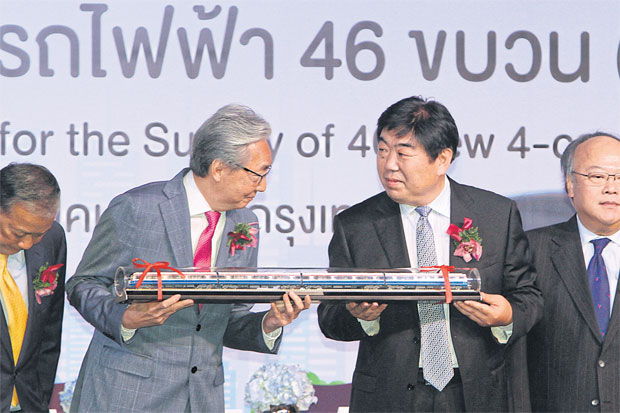OPTIMISTS BELIEVE the controversial Thai-Chinese railway project, which has been under negotiations for more than three years, will go ahead despite some hindrances resulting from new conditions initiated by the Thai side.
On November 17, the Thai Cabinet approved a Framework of Cooperation (FoC) agreement with China for development of Thailand’s transport infrastructure from 2015-22. The three-page document has 21 clauses and is written in Thai, Chinese and English.
Under this FoC, both countries agreed to build standard-gauge railways covering the Nong Khai-Nakhon Ratchasima-Kaeng Khoi-Map Ta Phut route and the Kaeng Khoi-Bangkok route with a combined distance of 873 km.
The FoC agreement was signed on December 3, 2015 at the 9th round of negotiations. On December 19, there was a ceremony to mark the start of this ambitious project whose cost is estimated to top Bt500 billion.
But the scheme appears to have hit a snag after new conditions were initiated. Aksornsri Phanishsarn, director of Thai-Chinese Strategic Research Centre, told The Nation several issues remain that are hindering the project.
For example, the project’s overall cost is not yet finalised nor is the interest rate on loans from China.
According to the previous rounds of negotiations, the project would be implemented on an Engineering Procurement Construction (EPC) basis whose details have not been finalised either, especially with regards to the issue of local content.
Aksornsri said sources of funding are another issue as the project may consider applying for loans from the newly established Asian Infrastructure Investment Bank (AIIB), which is led by China. Citing problems concerning similar projects in Indonesia and Laos, she said the Thai side has taken its time to ensure the project would be successful.
“We’re paying attention to a lot of details [to avoid mistakes],” she added.
Somkid Jatusripitak, the deputy premier in charge of economic affairs, prefers that both countries set up a special purpose financial vehicle (SPV) first in order to pursue this project.
The latest proposal is for China to hold the majority stake of 60 per cent in this SPV, which will be responsible for the entire Bt500-billion investment in this scheme, while the Thai side will take up the other 40 per cent.
Since this project will form a crucial part of China’s One-Belt-One-Road initiative, China should be responsible for the majority of the investment.
The Nong Khai-Nakhon Ratchasima-Bangkok route will be linked with the same railway in Laos and southern China to create a railway link between Asia and Europe.
At this stage, China has reportedly rejected the Thai proposal, as it was prepared only to invest in the railway operation, while the railway infrastructure investment was to be provided by Thailand.
China reportedly has sought to obtain the right to develop properties along the routes near the stations if it took up a larger investment burden, but this was not acceptable to Thailand.
Generally speaking, about 80 per cent of the overall Bt500-billion investment would be for construction of the railway infrastructure, while the railway operations investment would account for only 20 per cent of the entire project cost.
Given that the EPC model might not be feasible for Thailand due to its heavy investment burden, the alternative SPV model seems more likely.
It could be a form of government-to-government joint venture similar to the SPV set up last year for development of the Dawei deep-sea port and industrial estate project in Myanmar, involving the Myanmar, Thai, and Japanese governments as equal shareholders.
Democrat Party deputy leader Korn Chatikavanij has suggested the build-operate-transfer (BOT) model or a 51:49 Thai-Chinese SPV model.
Source: http://www.nationmultimedia.com/national/Thai-Chinese-railway-project-bogged-down-in-negoti-30281481.html


